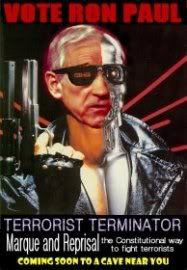"Retreat Hell! We're just attacking in another direction."-- Major General Oliver P. Smith, USMC, Korea, December 1950
A smart hawk wants to bring troops home safely and wisely as part of a carefully planned grand strategy to strengthen US national security.
Ron Paul’s “immediate” withdrawal is safe and steady with a glidepath to a soft landing which then allows us to strike an even stronger force posture.
Ron Paul will be inaugurated in early 2009, almost a year in the future. The common estimate for withdrawal is 1-2 brigades per month. Withdrawal might be complete by 2010, 3 years after the “surge” was supposed to fix everything in 3 months, 7 years after the re-invasion of 2003, and 20 years after the Iraq war began in 1990.
If we haven’t fixed Iraq after 20 years of military intervention, it probably wasn’t fixable in the first place.
How will President Ron Paul withdraw?
President Ron Paul gives the order and the military carries out the order. Do not insult our professional military by suggesting that the president has to micromanage how they do their job:
- The military already should have withdrawal plans on the shelf and ready to go. After all, what would happen if a hot war started in Korea tomorrow? It is the military’s job to have contingency plans. That is why units have planning staffs. If they do not have plans ready, courts martial are in order.
- The military has standard operating procedures for logistical movements such as a withdrawal. The formula is the Time-Phased Forces-Deployment List (TPFDL), nicknamed "tip-fiddle" or "tip-fid." Punch in the specifications and tip-fid produces spreadsheets of everything involved for smooth execution.
- If you believe that American troops are dedicated and professional, you should not worry about “how” the withdrawal would occur (as if the army had never left anywhere before).
What would happen if tens of thousands of US troops suddenly withdrew from the rest of the world?
They already have, and you probably never noticed:
- After the fall of the Soviet Union, something in the neighborhood of a quarter-million US troops left Europe. The sky did not fall.
- We closed major bases in Asia-Pacific (the Philippines). The sky did not fall.
- The Department of Defense had a half-million fewer people 10 years after the Soviet Union collapsed. The sky did not fall.
- During the 2003+ Iraq war, Bush ordered thousands more troops to leave Europe. The sky did not fall. (Unfortunately, this smart move is being reversed.)
19 hijackers perpetrated 9/11 DESPITE the 1.4 million member Department of Defense (DoD). Taxing Americans for 2 million DoD personnel would not have prevented 9/11.
There are only about 140 first-generation, hardcore al Qaeda people left in the Pakistan area, plus a somewhat larger number of second-generation, pre-9/11 people. Now if only we could stop MAKING third-generation terrorists by trying to nation-build the world at gunpoint. Increasing the US military from 1.4 to 1.5 million is irrelevant because anti-terrorism is asymmetric and unconventional, not meant for standard military units.
The glaring waste of continued Iraq deployment is evident in today's 3/3/08 military report from northern Iraq covering 12 million people in an area the size of Georgia:
"[The 1st Armored Division] Task Force Iron has been focused on three lines of operation: security, governance and economics."--Deputy Commander Brigadier General Tony Thomas, Multinational Division-North and the 1st Armored Division, Operating Base (COB) Speicher just outside of Tikrit, covering provinces of Nineveh, Kirkuk, Salahuddin, Diyala and the three provinces of the Kurdish Regional Government of Dohuk, Erbil and Sulimaniyah
- Why is an armored division responsible for the economy? There is a reason that WWII General Eisenhower did not hurl thousands of economists onto Normandy Beach on D-Day, and likewise leaders should not hurl combat soldiers at economic problems. Even Pakistani dictator Musharraf is removing military officers from their poor management of civilian functions that hobbles the Pakistani economy.
- A US general in charge of Iraqi governance a half-decade after the takeover is an odd lesson in “democracy.”
- A US armored division is not for anti-terrorism, not for governance, and not for economics.
- The misuse of our troops is causing morale, retention, and recruitment problems. We are losing high-quality people who leave the service. Others suffer PTSD or commit suicide. These policies weaken our national security for when we truly need an armored division.
America needs to get its priorities straight with a sound military strategy:
- Use intelligence and special units to fight terrorists.
- Keep conventional forces trained and ready to meet conventional threats.
- Keep an unbeatable military.
- America does not need a massive army. The Soviets had a large army and lost the Cold War. Occupying Asia is not America’s destiny.
- Admiral Alfred Thayer Mahan was an American officer who first led America to be a world-class naval power by theorizing that he who controls the seas controls the world. America can be the world’s most powerful nation simply by controlling the seas.
- The US spends as much on its military as the rest of the world combined. The US could cut its spending in half and still be the world’s most powerful nation.
Work smarter, not harder.
The Iraq withdrawal will be part of a global realignment that will make America stronger and more secure.
Captain Ron Paul’s “withdrawal” is simply advancing America to a stronger position.


No comments:
Post a Comment